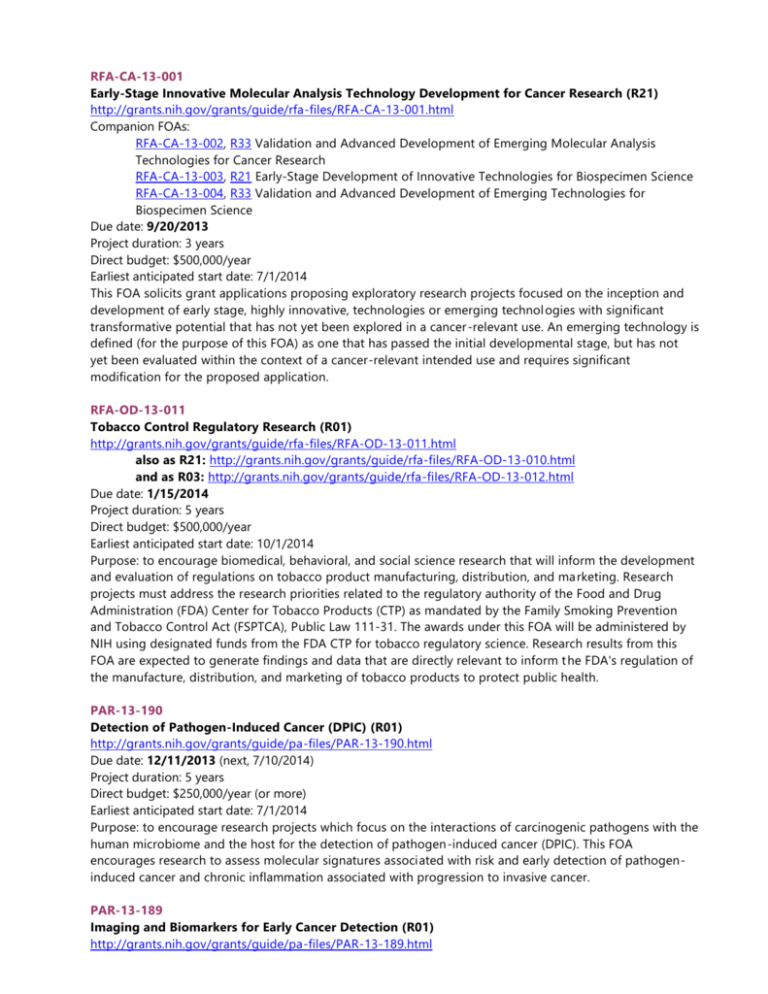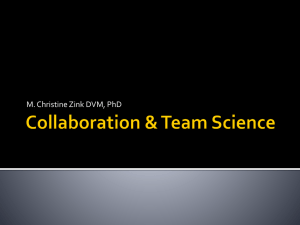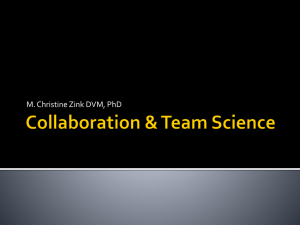RFA-CA-13-001 Early-Stage Innovative Molecular Analysis
advertisement

RFA-CA-13-001 Early-Stage Innovative Molecular Analysis Technology Development for Cancer Research (R21) http://grants.nih.gov/grants/guide/rfa-files/RFA-CA-13-001.html Companion FOAs: RFA-CA-13-002, R33 Validation and Advanced Development of Emerging Molecular Analysis Technologies for Cancer Research RFA-CA-13-003, R21 Early-Stage Development of Innovative Technologies for Biospecimen Science RFA-CA-13-004, R33 Validation and Advanced Development of Emerging Technologies for Biospecimen Science Due date: 9/20/2013 Project duration: 3 years Direct budget: $500,000/year Earliest anticipated start date: 7/1/2014 This FOA solicits grant applications proposing exploratory research projects focused on the inception and development of early stage, highly innovative, technologies or emerging technol ogies with significant transformative potential that has not yet been explored in a cancer-relevant use. An emerging technology is defined (for the purpose of this FOA) as one that has passed the initial developmental stage, but has not yet been evaluated within the context of a cancer-relevant intended use and requires significant modification for the proposed application. RFA-OD-13-011 Tobacco Control Regulatory Research (R01) http://grants.nih.gov/grants/guide/rfa-files/RFA-OD-13-011.html also as R21: http://grants.nih.gov/grants/guide/rfa-files/RFA-OD-13-010.html and as R03: http://grants.nih.gov/grants/guide/rfa-files/RFA-OD-13-012.html Due date: 1/15/2014 Project duration: 5 years Direct budget: $500,000/year Earliest anticipated start date: 10/1/2014 Purpose: to encourage biomedical, behavioral, and social science research that will inform the development and evaluation of regulations on tobacco product manufacturing, distribution, and ma rketing. Research projects must address the research priorities related to the regulatory authority of the Food and Drug Administration (FDA) Center for Tobacco Products (CTP) as mandated by the Family Smoking Prevention and Tobacco Control Act (FSPTCA), Public Law 111-31. The awards under this FOA will be administered by NIH using designated funds from the FDA CTP for tobacco regulatory science. Research results from this FOA are expected to generate findings and data that are directly relevant to inform t he FDA's regulation of the manufacture, distribution, and marketing of tobacco products to protect public health. PAR-13-190 Detection of Pathogen-Induced Cancer (DPIC) (R01) http://grants.nih.gov/grants/guide/pa-files/PAR-13-190.html Due date: 12/11/2013 (next, 7/10/2014) Project duration: 5 years Direct budget: $250,000/year (or more) Earliest anticipated start date: 7/1/2014 Purpose: to encourage research projects which focus on the interactions of carcinogenic pathogens with the human microbiome and the host for the detection of pathogen-induced cancer (DPIC). This FOA encourages research to assess molecular signatures associated with risk and early detection of pathogeninduced cancer and chronic inflammation associated with progression to invasive cancer. PAR-13-189 Imaging and Biomarkers for Early Cancer Detection (R01) http://grants.nih.gov/grants/guide/pa-files/PAR-13-189.html Due date: 12/11/2013 (next, 7/10/2014) Project duration: 5 years Direct budget: $250,000/year (or more) Earliest anticipated start date: 7/1/2014 Purpose: to facilitate collaborative imaging and biomarker research to improve cancer screening, early cancer detection and diagnosis by integrating multi modality imaging strategies and multiplexed biomarker methodologies. PAR-13-185 Image-guided Drug Delivery in Cancer (R01) http://grants.nih.gov/grants/guide/pa-files/PAR-13-185.html Due date: 11/19/2013 (next, 6/19/2014) Project duration: 5 years Direct budget: $250,000/year Earliest anticipated start date: 7/1/2014 Purpose: to support innovative research projects that are focused on image-guided drug delivery (IGDD), including real-time image guidance, monitoring, quantitative in vivo characterizations and validation of delivery and response. It will support research in development of integrated imaging -based platforms for multifunctional and multiplexed drug delivery systems in cancer and other diseases, quantitative imaging assays of drug delivery, and early intervention. PAR-13-159 The Role of Microbial Metabolites in Cancer Prevention and Etiology (U01) Due date: 11/14/2013 (next, 11/14/2014) Project duration: 5 years Direct budget: $250,000/year Earliest anticipated start date: 7/1/2014 Purpose: preclinical and clinical research that will describe the effect of microbially generated metabolites in cancer prevention/ progression and the molecular mechanisms underlying these effects: proliferative/apoptotic responses, cytokine production, inflammatory and immunomodulatory effects locally and/or distant. This FOA encourages pre-clinical and clinical studies that will describe the variability in the bacterial metabolites production and their contribution to cancer prevention/promotion among va rious racial and ethnic groups. Due to inconsistent responses to dietary interventions, this research is necessary to identify who might benefit from specific dietary recommend ations and who might be placed at risk. It is important to identify the factors that contribute to differences in response to foods and food components and to identify early markers that will identify those who will receive maximum benefits from dietary change. PAR-12-095 Basic Cancer Research in Cancer Health Disparities (U01) http://grants.nih.gov/grants/guide/pa-files/PAR-12-095.html Companion FOAs: PAR-12-094, R21 Exploratory/Developmental Grant Due date: 6/20/2013 (next, 11/20/2013) Project duration: 5 years Direct budget: $250,000/year Earliest anticipated start date: 4/1/2014 Purpose: Through this Funding Opportunity Announcement, the Center to Reduce Cancer Health Disparities (CRCHD), the Division of Cancer Biology (DCB) and Division of Cancer Prevention (DCP), at the Nat ional Cancer Institute (NCI), encourage grant applications from investigators interested in conducting basic, mechanistic research into the biologic/genetic causes of cancer health disparities. These cooperative agreement research awards (U01) will support innovative studies designed to investigate biological/genetic bases of cancer disparities, and may include the development and testing of new methodologies and models, secondary data analyses, and mechanistic studies of identified biological factors assoc iated with cancer disparities, including those related to basic research in prevention strategies. PAR-12-049 Cancer Education Grants Program (R25) http://grants.nih.gov/grants/guide/pa-files/PAR-12-049.html Due date: 5/25/2013 (next, 9/25/2013) Project duration: 5 years Direct budget: $300,000/year Earliest anticipated start date: 4/1/2014 Purpose: The NIH Research Education (R25) grant mechanism supports creative and innovative research education programs for the development of biomedical, behavioral, and clinical researchers, or for education and outreach on health-related research to a variety of audiences. Research education grants are not typical research instruments. The awards are intended to support institutional educational programs but not research projects. Applications must include a plan to evaluate the educational activities proposed (see Section IV, Evaluation Plan) and a plan for disseminating results (see Section IV, Dissemination Plan). PAR-12-039 Small Grants Program for Cancer Epidemiology (R03) http://grants.nih.gov/grants/guide/pa-files/PAR-12-039.html Due date: 7/23/2013 (next, 11/19/2013) Project duration: 2 years Total direct budget: $100,000 Earliest anticipated start date: 4/1/2014 Purpose: This funding opportunity announcement encourages the submission of Small Research Grant (R03) applications for research on cancer etiology and epidemiology. The overarching goal of this FOA is to provide support for pilot projects, testing of new techniques, secondary analyses of existing data, development and validation of measurement methods, linkage of genetic polymorphisms with other variables related to cancer risk, and development of innovative projects for more comprehensive research in cancer etiology and epidemiology. PAR-12-140 Role of the Microflora in the Etiology of Gastro-Intestinal Cancer (R01) http://grants.nih.gov/grants/guide/pa-files/PAR-12-140.html Due date: 7/2/2013 (next, 11/1/2013) Project duration: 5 years Direct budget: $250,000/year Earliest anticipated start date: 4/1/2014 Purpose: This Funding Opportunity Announcement, issued by the National Cancer Institute and the National Institute on Alcohol Abuse and Alcoholism, encourages innovative multidisciplin ary research projects that will advance our mechanistic understanding of microflora influences on Gastro -Intestinal (GI) carcinogenesis. This FOA seeks applications that leverage and integrate information from large, meta -omic data sets to guide studies that identify critical microbial activities that can be mechanistically linked to GI carcinogenesis. Applicants may draw from existing large data sets, and may also propose to generate appropriate new data, including but not limited to data from both gene an d protein analysis, such as DNA sequence and copy number, post-translational modifications, secreted signals, and protein-protein interaction data between host factors and individual microbial species, or communities of microbes. ........................................................................................ KUCC Grants Development Office ........................................................................................ Anca Geana, MBA, CRA Grants Coordinator Univ. of Kansas Cancer Center Phone: 913-945-6323 e-mail: ageana@kumc.edu






